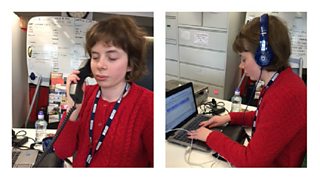Production Apprentice: Bridget Norman shares her experience working with 主播大秀 Radio 4
Bridget Norman
Production Apprentice
Tagged with:

For the last six months I've been working on Saturday Live, 主播大秀 Radio 4's Saturday morning show. It is a round table set up (four to five live guests in the studio) with individual interviews and informal chat between them. There are three pre-recorded items: a feature, a ‘Thank You’ slot and a celebrity’s 'Inheritance Tracks'.
I have been helping to find possible live guests, researching their potential, pitching them to my editor at our weekly ideas meeting and then writing briefs on the guests for our presenters. I help with the programme’s ‘Thank You' slot, too: this is where the team record listeners who get in touch with the programme to share their stories of people who did them a good turn but who they never had the chance to thank at the time. Some are so moving.
I suggest the Thank Yous that stand out from all the ones we receive, and then I may telephone the listener who has been agreed on to find out more about them before the recording. Sometimes I have a go at editing it ready for the programme. It has been a vertical learning curve but really exciting slowly taking on more responsibility in the team.
When writing a brief I've learned to make sure that I give the presenters accurate, interesting and succinct information. It's important because the show is ‘live’ so they need all their facts right before they go on air, unlike pre-recorded programmes there is no safety net. The brief should leave them curious to get as much as possible out of the guest they will be interviewing, but it must not take them too long to read quickly or they might miss key bits out.
Armed with a list of names that could be possible guests, I look into each one hoping to find any unusual hobbies or a personal story and then drop the ones that don't sound right for the programme. Saturday Live likes people who are fun, a bit eccentric and who have several ‘strings to their bow’.
For example, recently we had an architect on who had also twice been world air guitar champion (I know, who even knew there was one?) and a fly fisherman who helps conserve chalk streams and otters. Sometimes I discount people if they don't have enough hobbies, are a bit too worthy, or I can't find a personal angle for them – although there are exceptions. Before suggesting someone I firstly check if they are still available, whether they've been on the show before, and ensure I can sum up in one sentence for my editor why they would be a good guest.
Everyone at the 主播大秀 has been really friendly and welcoming, from the security guards - who I'm on first name terms with now - to my colleagues who have been here sometimes longer than I have been alive, but who still treat me as an equal. To me the 主播大秀 is like a lioness, slow to trust outsiders but once you are working there it protects you like one of its own.
It is strange how quickly you settle into a daily routine and forget that whilst you may just be ‘going to the office’, that office is in the massively respected institution that is the 主播大秀. Being on one placement for so long has really let me get under the skin of the programme and work at tailoring my ideas to ones that answer the programme's central question of, is it fun? It has let me ease my way into the world of work, which is a big change from sitting A-levels at school, but just like exams you get out of work what you put in. It feels great being measured against the standards of those with more experience, giving me a benchmark to aim for and shows that the team value me and think me capable of improvement.
Speaking up in meetings was very difficult at first, but positive and encouraging feedback from my editor and producers has helped a lot with my self-confidence. My colleagues couldn't have been more supportive and as long as you know what you are asking for or need help with, people are only too happy to oblige.
So far this year I have both gained skills and developed as a person and learned how better to play to my strengths. In fact I have learned as much about myself as I have about the media industry, if not more! I won't pretend that there haven't been some extra challenges because of my disability. I am blind so, for example, I cannot see people's facial expressions which can be a barrier to starting conversations. I use speech assisted software which reads the screen to me, so I am nearly always wearing headphones. This means that people don't always think they can interrupt me, even though I would be only too happy to talk as I do enjoy a good chat.
As a result I am slowly learning to become more outgoing in order to build good working relationships. Rather than waiting 20 years or more to share my Thank You I will say it now, ‘Thank you 主播大秀 for letting me do this and here’s to the next few months being just as amazing.’
